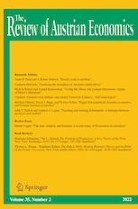
ABSTRACTS BIOGRAPHIES ENDORSEMENTS REVIEWS FB DISCUSSION SCHEDULE
ROGER E. BISSELL, CHRIS MATTHEW SCIABARRA, EDWARD W. YOUNKINS, EDS.
THE DIALECTICS OF LIBERTY:
EXPLORING THE CONTEXT OF HUMAN FREEDOM
REVIEW OF AUSTRIAN ECONOMICS (7 July 2022), Springer
Freedom
in Context
By
Alexander W. Craig
(Visiting
Assistant Professor of Economics and Business at Beloit College)

Alexander W. Craig writes:
The contributors to The Dialectics of Liberty demonstrate that libertarians can engage in a careful context-sensitive analysis of social behavior and political ideals. The book refutes the notion that libertarians must be insensitive to nuances in social environments and reliant on a woefully oversimplified conception of individuals, businesses, and governments. In this review, I first discuss the nature of dialectics, making explicit the mostly implicit definition running between the chapters of The Dialectics. I then summarize several of the chapters, synthesizing from them generalizable lessons about what Austrian economists and classical liberal scholars more generally can learn by being mindful of social context, synthesizing disparate ideas, and transcending dichotomies. ...
Where logic supplies the principles whereby one may validly move from premise to conclusion and empirics discover the line between what is actual and what is merely possible, dialectics serves to keep the analyst mindful of how propositions surrounding the main object of study may change the meaning of facts under discussion. ... Although all data is theory-laden, data never speaks for itself, etc., one can often take these data as they are and proceed, the empirical stage of research now giving way to the analysis stage. Logic retrospectively analyzes an argument and declares its conclusion valid or invalid based on the premises, which it has relatively little ability to discuss in themselves. Dialectics, however, is an approach to active inquiry. It makes recommendations about how an investigator might make progress in understanding a subject. Many issues one encounters in ongoing research are not so much questions of the internal and external validity of one's empirics or the logical validity of one's argument. They are issues of relevance and salience. ...
This orientation towards the
active process of investigation raises two more salient features of dialectical
thinking: tacking between subjects; and transcending divides. In many
situations, a researcher must find their place between at least two alternatives
that are in tension with one another. ... Dialectics often proceeds by
transcending such dichotomies by situating them within a context. ...
[The] deliberate intention to
think dialectically about one's work is likely to yield fruit for Austrian
economists and classical liberal scholars. ... [This book] succeeds in
demonstrating the existence and value of dialectical thinkers. It is a
stimulating series of inspirations for further work, and a useful reference for
many interesting directions of contemporary libertarian scholarship. I would be
pleased to see more scholars ask themselves not only "Is my evidence
compelling?" and "Is my argument sound?" but also "Have I considered the context
carefully?"